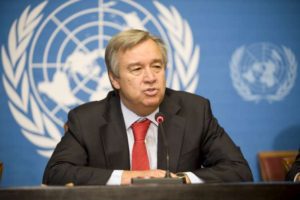Guterres nails his colours to the mast – first major interview
Solidarity among democratic nations has never been more important in a “largely chaotic world” riven with polarising populist politics and the threat of war and terror, according to the new UN Secretary General, Antonio Guterres.
Warning of the prospect of a particularly dangerous moment in history that has similarities to the run up to the First World War, Mr Guterres said only a renewed commitment to multilateral cooperation could head off the impending peril.
And he said that a united Europe was essential to prevent the world succumbing to deepening conflict.

Antonio Guterres
In a major media interview with European media, the former Portuguese Prime Minister said world was heading to what he termed “multipolarity”.
“It’s no longer a bipolar world, a unipolar world, but it’s not yet a multipolar world. It’s largely a chaotic world in many aspects,” he said.
“Impunity and unpredictability tend to prevail and not only are conflicts becoming more and more interconnected but they are also interconnected with this threat … of global terrorism,” Mr Guterres said.
He was talking about the new emerging and more precarious world order in which American pre-eminence has given way to challenges from both China and Russia and in which multilateral institutions appear weaker than at any point since WWII.
Mr Guterres, who served as UN high commissioner for refugees for a decade, has taken on the secretary general’s role at a time of heightened global tension fears for peace and security.
The conflicts in Syria and Yemen show no signs of abating and a series of famines are still current in the developing world, three in sub-Saharan Africa.
Meanwhile, rise of a nationalist backlash to immigration and globalisation has caused upheaval amongst political elites in Europe and the US.
Mr Guterres warned against the sort of popularism that surrendered democratic values to win votes and that embraced “alternative truths”.
He was referencing the “alternative facts” which have become a catchcry of the Trump White House – which has opposed many of the UN’s core principles.
Mr Guterres said that with other powers rising, a more multipolar world was inevitable but not necessarily less antagonistic than the unipolar world we are leaving behind.
“It might also increase the dangers of confrontation,” he said, in his first major interview since taking office on January 1.
“The point is, in my opinion, the multipolar world without strong multilateral institutions is not necessarily a peaceful one,” Mr Guterres said.
“Europe before the First World War was a multipolar Europe but there was no multilateral governance mechanism and the result was the First World War.
“I think to move into a functional multipolar world, the role of Europe is absolutely essential.
“I am a strong believer in a united Europe on the world stage, playing a positive role politically and in terms of development and humanitarian aid,” Mr Guterres said.
While he did not directly criticise the UK’s Brexit vote, saying it was a “sovereign decision by the British people”, he did say it was important for Europe to “learn the lessons of Brexit”.
These, he said, were “a more effective integration, reconciled with European public opinion”.
Mr Guterres said that more effective integration would only be possible with political leaderships that risked telling the truth about the challenges of globalisation, rather than simply blaming immigration.
“I think that political leaders need to be able to tell the truth and assert their values, even if that means losing the next elections,” he said.
“What we sometimes see are political leaders who forget about their values, use alternative truths as propaganda tools, just to win the next elections.”
Mainstream parties that pandered to prejudice to win votes tend to lose in the end to populists, because “when people have to choose between the original and the copy, they tend to choose the original”, he said.
With his past role at the UNHCR, most pundits expected Mr Guterres to play a more activist role than his predecessor Ban Ki-moon in terms of reforming UN institutions and as acting as a moral conscience to great powers in the security council.
He said he did not see himself as a protagonist in global problem-solving but rather “a bridge-builder, a convener, an honest broker, to help find solutions”.
But he also said he saw his role as an advocate.
“The secretary general must be in the frontline of the defence of all the principles that are essential in the UN charter, and namely all aspects of human rights,” he said.
Laurie Nowell
AMES Australia Senior Journalist












